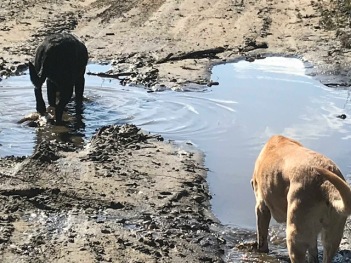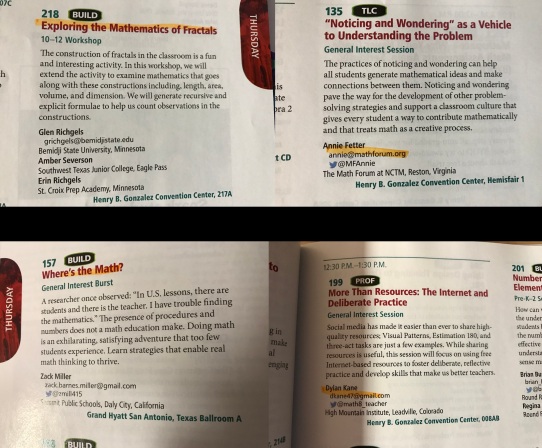First off, I would like to really say thank you to Annie (@Annieperkins) for being bold and posting her failure this week. It was a great story, reminder, and way to cope with what we do on a daily basis. Read her awesome post here.

This is why I really appreciate the MTBoS, there is no way I could have these discussions and reflections without it. It is a conversation I could have with my close colleagues (CLOSE colleagues, you don’t want everyone in the building knowing this), and even then when you are the only math teacher in the building it makes it hard to really connect with any condolences you may receive (because you know, our profession is SO much different than anyone else’s). It is comforting to know that others experience the same struggles that I do.
I can totally relate to Annie’s initial fears of “airing out” her failure. When I started blogging, I wrote one post to begin with, and didn’t post another for 6 months. Why was this? Feeling of failure and insecurity. I started blogging because I wanted a way to have reflections and records of what I did through the years, but I will be honest in the fact that “putting yourself out there” is very hard and immensely daunting. I mean, anyone can access my blog and read what I post, how will I be viewed as a person, teacher or presenter when I write about all of my shortcomings? Even now, I rarely tell anyone about my blog in district- I still have that fear. I’m getting better, and presenting at NCTM San Antonio was a huge breakthrough for me in this. I am far from where I feel I need to go, but I am a lot more accepting of what I do here on my blog and twitter.

(Like this Pic, I love that I’m presenting- but I’m like “My eyes are closed! Thanks Nicole, I look like a dumb-___!”)
So, off to my biggest fail- and I really have to thank Annie for making me revisit this blast from the past. It was a turning point in my teaching career, and it started me down this path to seeking people, research and resources to make myself into the teacher I wish I had (yea, here’s also to you Tracy!).
It was early in my teaching career, and I had gone through 4 administrators in the first 3 years of teaching. This year was proving no different, this was my second administrator for the year (the first had gotten into a car accident and passed away, so our middle school administrator started servicing both buildings) I was in my final year of administrator observations. Trying to lesson plan for that many different administrators and being a new teacher is a HUGE stress factor, I was used to test-taking for that many professors- having to focus on what they deemed important and be evaluated by their exams- but when it was the determining factor for my JOB it was a whole different level. Every administrator has a different focus and what they deem is important to teaching in “their” building. This administrator was a traditionalist, so I tried to “please” him for my observation.
The lesson was an exercise in boring. We had “student note” workbooks, which meant I spent the hour in direct lecture, drawing beautiful diagrams and defining vocabulary for students to then copy in their workbooks. This was one of the most difficult lessons I did (for me personally as a teacher, this wasn’t my style), it felt wrong- and there was a particular student who felt that way as well. I noticed him right after defining the term polynomial- he had his head propped up on his hand and had is eyes closed. This particular student was one who was “at-risk”: he rarely attended class, he had numerous discipline problems, a challenging home life, and he was behind on credits- but he was extremely smart. It took me a while to catch a hook on this student, and typically we had a good working relationship for class. He liked the way I typically approached class, and could not do “traditional.” His current status for this lesson wasn’t a surprise, and I tried to gather his attention by allowing students near him to share with the class, I taught from his general area instead of by the board- but I knew that if I called him out directly in front of his peers and in front of the principal there would be a problem. It was a tough choice to make since I was being observed, but since he was seated off to the side and towards the back of the room, I allowed him some space and continued with class.

The principal left during our “direct lesson note-taking” and when that was done, I followed through with the schema and assigned practice problems. Once I had this done, I approached my student and quietly talked with him in class about what he was doing, what we had covered and what would happen next. He told me he had a really tough night, there was a fight at his home and he stayed up most of the night protecting his siblings. He stated that no one ever came to the back of the trailer to their room, but he was afraid to sleep. He also told me he was sorry because he knew the principal was there, but he couldn’t stay awake. I quickly reviewed what we had went over, and he found a partner to work with and catch up on his notes. Not a major deal breaker in the least- as far as I was concerned.
The next day, I had a follow up with my administrator. That is where I found out that for the first time since I had been teaching, I failed. He did not have any sort of rapport with the student who was sleeping in class, and once he had come to the principal’s attention, everything I had done in class after that was forgotten. I was supposed to confront the student, get them awake and attentive- or send him to the ISS room to “rethink” his actions. This was a very hard observation meeting for me to attend, this was my last year of mandatory assessments, my last year of probationary teaching, and this man held the power to end my career at the school. Instead of sticking up for myself and my student, I shouldered the burden of being a bad teacher and was referred to a “master teacher” with which to work and council. I received an hour long “in-house PD” lesson on the fine arts of classroom management and student behavior from him. I had an extra observation that year from him as well as three more that was required from my co-operating teacher. At the end of the year, on the last day of school, I was called into his office (in the middle school building no less) to be told that I was no longer a high school teacher and I was moved to the middle school. I was to have another year of probation where I could be overseen by him personally. I won’t go into that next stress-filled year but all I could think about was that I was the worst teacher ever. I even actively sought out new positions in my area because I felt so much shame that I wasn’t sure I could work in the district anymore.

I was a bad teacher, so bad I had to move to a different school, teach a different grade, have a mentor and be personally watched over by the principal
It was difficult for me that summer, my teaching self-esteem was shattered. There wasn’t any local teaching jobs open in my area and although I applied for any other related type of field I didn’t get any calls for interviews. This left me in a low that I had never really felt before- I even almost went back to bartending just so I didn’t have to work another year for a man I was sure was using me for another year before sending me on my way.
I can’t thank my wife and friends enough that summer, they kept me doing things and always were great ears for me. They convinced me to keep moving forward, to prove who I was and to take this new challenge and make the best of it I could. Standing outside my car, outside that building and taking that first step into the middle school, his place of power, was a very difficult step to take. Although I never gave into his vision of what kind of teacher I should be, the whole experience did shape me into the teacher I now am.
Wow, I can’t believe I actually just typed all of this and am going to put it out there on the web- but I do realize that now that I have I can start being more accepting of the smaller failures I have along the path of teaching.
Teaching students is the biggest act of being human. I hated that most instructors feel they have to come from a place of absolute power and certainty. I knew this was never the truth because all through school I thought about Math differently than it was presented to me, I played the game however and on tests I would replicate the work they wanted me to do. There were times I forgot and I had many long talks with the teacher explaining my work. As teachers we can’t be afraid to show students that we too struggle with work, make mistakes and feel like failures. Students need to know that it’s OK for that to happen, but it doesn’t have to shape who you are. We also have to teach them how to get back up from failure and keep going, no matter how hard it seems. This is what being a teacher truly is.

I failed myself that day, and I failed my students- not because of my lack of content knowledge but because I was afraid to show an outsider who I really was and how I used that to create a learning environment where all of my students have the opportunity to be successful. If you see me in class, you will see one of these being used by me, in a way I feel comfortable with that allows my students to own their own mathematical ability- not mine.

What did I realize a few years later (well, actually 3 years later when that Administrator also left the district)? I was a good teacher, I made the right call for all of my students at the time, and no one in that room (other than my administrator) thought I was not doing my job or supporting them to my fullest.
Sometimes, being a “failure” is actually the best thing that can happen to you. Thanks Annie for inspiring me to share this story and many more in years to come.



























